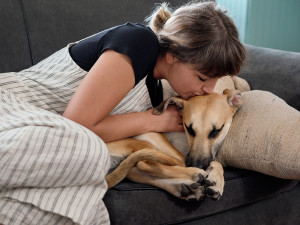A Business Insider Article Says Millennials Spoil Their Pets Too Much—Experts Disagree
Do you treat your pet like your child?

Share Article
Like many pet parents, I frequently worry that I’m not giving my dog the best life possible. I worry that his pain is going unnoticedopens in a new tab or that he’s boredopens in a new tab. I worry that he finds the human world too limiting. But the fear that I care too much about him — pay too much attention to him, or am too considerate of his needs — has never crossed my mind.
Apparently this is something I should be worried about, according to a recent Business Insider article titled opens in a new tab“Generation Fido.” It argues that childless millennials, like myself, are harming their pets by giving them too much consideration — or, as it says, treating them like children. “Millennials are raising pets instead of kids,” the article’s subhead claims. “It’s not going well for the pets.”
The assertion that millennials treat their pets like human childrenopens in a new tab is not a new one, but I’m never quite sure what it means. Are we enrolling our dogs in competitive Pre-K programs? Awkwardly explaining to them how babies are made? Well, no. To me, the implication seems twofold and somewhat unsettling: First, that a high level of care is a privilege reserved exclusively for the human species. And second, that people of child-rearing age who aren’t raising children are unnaturally redirecting an innate parenting energy elsewhere. That statement implies that these people haven’t fulfilled their biological purpose and have gone haywire as a result.
The idea that pets are “being raised like human children” is further confused by the fact that people, like the article’s writer, Aimee Pearcy, use it to make the assumption that treating a pet like a kid is a bad thing. (Are all of the human children she knows being raised poorly or something?) She suggests that millennials are “spoiling” pets by considering them when planning vacations, spending money on themopens in a new tab, and allowing them — among other things — unmitigated access to the furniture. More substantially, it warns against overfeeding and giving constant attention, which Pearcy says could lead to separation anxiety, among other behavioral issuesopens in a new tab.
It’s true and important to note that obesity and anxiety in our petsopens in a new tab are issues that pet parents need to address. It is equally important to distinguish between providing comfort, love, and care, and doing harm. To help us untangle the accusations, I spoke with Juliana DeWillemsopens in a new tab, certified dog behavior consultant and dog trainer, as well as Dr. David Israelopens in a new tab, medical director at Veterinary Emergency Group in Denver, Colorado, and Dr. Ann Hohenhausopens in a new tab, senior veterinarian at Schwarzman Animal Medical Center in New York City.
First of all, pets are not to blame for declining birth rates.
The accusation that millennials are raising their pets as children (and that this is a bad thing) is often bolstered by a correlative link to declining birth rates. Again and again in her article, Pearcy reminds us that rates of parenthood are falling. “A recent study published opens in a new tabin The Lancet predicted that by the year 2100, more than 97 percent of countries and territories will have fertility rates below the levels needed to sustain their populations,” Pearcy writes. “Meanwhile, the number of people with pets continues to climb.” Although Pearcy doesn’t explicitly say this, one could leave with the impression that an unhealthy obsession with our pets is a contributing factor to — perhaps even a leading reason behind — lower birthrate numbers.
However, in the cited Lancet study (and in every discussion of declining birthrates I’ve come across) pets are not mentioned as a contributing factor. Instead, the reasons include access to contraception and better opportunities for education and employment, as well as challenges like poverty, growing concerns over the climate, threatened access to reproductive healthcare, lack of paid family leave, and inflation, among other things.
So, for those concerned that millennials treating their pets “like human children” will have severe consequences for the world’s population — fear not. But for those with genuine concern about the wellbeing of the animals, your fears are not wholly unfounded (it’s just not millennials’ fault).
Obesity is a problem in pets — but not just those with millennial parents.
Business Insider warns that overfeeding pets whenever they ask for food, and luxury diets (like raw foodopens in a new tab) can lead to obesityopens in a new tab. And obesity is, indeed, a major problem for our pets. According to a 2022 surveyopens in a new tab from the Association for Pet Obesity Prevention, obesity affects 59 percent of dogs and 61 percent of cats — staggering numbers that represent, if you can believe it, animals under the care of both childless millennials and members of other generations alike. “I can speculate that since a majority of pets are overweight or obese,” Hohenhaus tells Kinship, “all types of pet owners spoil their pets by overfeeding.”
“Certainly, spoiling animals by overfeeding can cause obesity, which can lead to health issues,” David Israel tells Kinship, “and studies have shown that overweight dogs live shorter lives than those who are not overweight.” So, pet parents should make sure they’re feeding and treating an appropriate amount. Hohenhaus says treats should make up, at most, 10 percent of your pet’s daily caloric intake; a typical cat, she says, needs 250 to 300 calories per day, while a dog’s caloric needs typically depend on weight.
Both Hohenhaus and Israel tell pet parents to use caution with raw-food diets, which carry a high risk of foodborne illness from bacterial contamination for both pets and the humans who prepare their food. For other specialized diets, it’s important to make sure you’re meeting all of your pet’s nutritional needs. “If you choose to feed a boutique food, or your pet needs a boutique food due to a food sensitivity or allergy,” Israel says, “consult with your veterinarian first.”
“Spoiling” is probably not influencing your pet’s behavior — but certain conditions might be reinforcing it.
DeWillems tells Kinship that there is no recent data to support the idea that behaviors like taking a dog along on tripsopens in a new tab, allowing them on furniture, and sharing food have an impact on a dog’s behavior. (To the contrary, she shared two studies — a 1992 study opens in a new tab on anthropomorphism and behavioral problemsopens in a new tab, and a 2001 studyopens in a new tab on separation anxietyopens in a new tab — that showed the opposite.) I won’t pass up the opportunity to note that both those studies were done long before millennials were adults adopting and parenting pets.
What we do know about behavior is that it is shaped by its environment and consequences. To understand why a dog behaves a certain way, DeWillems says, observe what happens right before, during, and after the behavior to identify what cues it and what reinforces it. “This empowers you to change those conditions and change the behavior.”
While attention from you might be reinforcing certain unwanted behaviors, and recognizing this can help address them, it’s important to understand that this doesn’t mean too much attention or spoiling is causing the behaviors. “Concepts like ‘boundaries,’ ‘respect,’ and ‘entitlement’ are all human constructs that dogs are completely unaware of,” she says. “Dogs simply do what works for them, and if their ‘naughty’ behavior gets attention from you, there’s a good chance they’ll do it more often.”
DeWillems is careful to add that this is not the case for all undesirable behaviors — they can also be the product of an unmet need, anxiety, pain, or another medical issue. Rather than restrict access to comforts or love, “get curious about what’s prompting the behavior, what’s reinforcing the behavior, what behavior you want them to do instead, and how you can help them be successful in those moments.”
Anxiety is a serious issue, but ignoring your pet is not the way to solve it.
DeWillems disagrees with the notion that too much attention from pet parents causes anxiety in dogs, emphasizing that dogs are inherently social creatures. “This misinformation can, at best, make humans feel guilty for loving their pets, and at worst, lead them to withhold love and affection,” she says. “Both outcomes can harm the human-canine bond.”
While separation anxiety in dogs may sometimes include a strong attachment to their human, Israel notes that “there are likely genetic and other factors” involved. This type of anxiety can result in severe consequences, including destructive behavior or self-injury. “I’ve seen dogs jump through windows or injure their paws trying to dig opens in a new tabout of a crate or under a door,” he says.
If you suspect your pet is struggling with anxiety, the first step should be consulting a veterinarian — not resorting to “tough love” or limiting affection. “The idea that less attention will cure a dog’s anxiety risks prolonging their suffering,” DeWillems warns. “It prevents us from addressing the real reasons behind the anxiety and seeking proper treatment”.
DeWillems does caution that too much attention can become problematic if it disrupts a dog’s sleepopens in a new tab; chronic sleep deprivation opens in a new tabcan lead to behavioral issues. “As long as your dog’s sleep, exercise, and species-specific needs are being met, she reassures, “you can give them as much attention as you want!”
Considering your pet a family member (even a child) is perfectly fine, as long as you’re meeting their needs.
DeWillems sees little downside to considering your pet a family member. “Loving your dog as a family member, involving them in family activities they enjoy, doting on them, spoiling them, and making decisions as if they were your child is not detrimental to their behavioral wellbeing,” she says. In fact, she says the human-canine bond is so vital that discouraging people from treating their dogs like family could risk harming both the person and the dog.
Problems only arise when pet parents overlook a dog’s biological needs, such as exercise, enrichment, and species-specific behaviors like chewing, sniffing, and destruction. (This issue, of course, isn’t exclusive to those who treat their dogs like children.) “Not providing a dog with proper movement, enrichment, and play because you see them as more child-like than dog-like can cause major behavior issues,” she warns. With education about what dogs truly need to thrive, DeWillems believes it’s entirely possible to treat your dog like family — yes, even like a child — while still honoring their essential canine instincts.
One of the most valuable skills for dog parents, she says, is learning to observe and interpret dog body language: ”Your dog will tell you what they are enjoying or not.” Recognizing stress signalsopens in a new tab, such as panting, yawning, whale eye, ears back, or a tucked tail is the quickest way to understand how your dog feels during any activity. This, combined with an understanding of species-specific needs, can help ensure your dog’s emotional and physical wellbeing.
And, please — go ahead and let your pet on the couch (or in your bed).
“This is really about personal preference and not pet wellbeing,” Hohenhaus says, regarding whether there is any behavioral or health-related reason to limit pets’ access to furniture. So please, go ahead and let them onto the couch, or into your bedopens in a new tab. Our pets do their best — for their entire lives — to fit into a world that was not made for them. The least we can do is provide them a little bit of comfort.
References
Pearcy, Aimee. “Millennials Are Raising Pets instead of Kids. Bad News for Dogs, Cats.” Business Insider, 7 Nov. 2024, www.businessinsider.com/millennials-raising-pets-instead-kids-spoiled-dogs-cats-anxiety-health-2024-11.
GBD 2021 Fertility and Forecasting Collaborators. “Global Fertility in 204 Countries and Territories, 1950-2021, with Forecasts to 2100: A Comprehensive Demographic Analysis for the Global Burden of Disease Study 2021.” Lancet (London, England), vol. 403, no. 10440, 19 Mar. 2024, pp. S0140-6736(24)005506, pubmed.ncbi.nlm.nih.gov/38521087/, https://doi.org/10.1016/S0140-6736(24)00550-6.
Voith, Victoria L., et al. “Is There a Relationship between Canine Behavior Problems and Spoiling Activities, Anthropomorphism, and Obedience Training?” Applied Animal Behaviour Science, vol. 34, no. 3, Aug. 1992, pp. 263–272, https://doi.org/10.1016/s0168-1591(05)80121-2. Accessed 5 Dec. 2024.
Flannigan, Gerrard, and Nicholas H. Dodman. “Risk Factors and Behaviors Associated with Separation Anxiety in Dogs.” Journal of the American Veterinary Medical Association, vol. 219, no. 4, Aug. 2001, pp. 460–466, https://doi.org/10.2460/javma.2001.219.460.

Kelly Conaboy
Kelly Conaboy is a writer and author whose work has been featured in New York Magazine, The New York Times, and The Atlantic. Her first book, The Particulars of Peter, is about her very particular dog, Peter. (Peter works primarily as a poet.)
Related articles
![Man kissing his black and white dog outside in the woods.]() opens in a new tab
opens in a new tabYounger People Are More Likely to View Their Pets as Children, New Study Finds
Bring out the puppy strollers.
![A woman kissing her dog on a couch.]() opens in a new tab
opens in a new tabMillennials Are Choosing Pets Over Kids, Study Finds
A study found that millennials are choosing pets over kids. Here’s why.
![Stylish woman and adorable dog holding christmas gift under christmas tree with lights.]() opens in a new tab
opens in a new tabHere Are the 10 States With the Most Spoiled Dogs
How much did you get your dog for the holidays?
![Man hugging his fluffy white dog happily]() opens in a new tab
opens in a new tabChemistry Between People and Dogs Is Real (It’s Science)
How the “love hormone” oxytocin connects us with our pups.
![Woman laying with her dog on the couch at home.]() opens in a new tab
opens in a new tab50% of Americans Cancel Plans to Hang out With Their Pets — Are You One of Them?
FOMO doesn’t apply when there’s a dog or cat at home.







